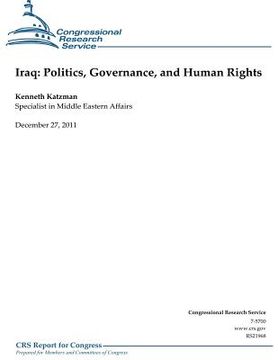Synopsis "Iraq: Politics, Governance and Human Rights (in English)"
After extensive sectarian conflict during 2006-2008, but with U.S. troops still present, Iraq's political system evolved into relatively peaceful political competition and formation of crosssectarian alliances. However, the dominant factions have, by several accounts, often exercised questionable use of key levers of power and legal institutions to arrest or intimidate their opponents. This infighting is based on the belief of many factions that holding political power may mean the difference between poverty and prosperity, or even life and death. The schisms significantly delayed agreement on a new government following the March 7, 2010, national elections for the Council of Representatives (COR, parliament). With U.S. diplomatic help, on November 10, 2010, major ethnic and sectarian factions finally agreed on a framework for a new government under which Prime Minister Nuri al-Maliki is serving a second term. As the completion of the U.S. withdrawal from Iraq at the end of 2011 approached, relations among major factions frayed, and worsened substantially after the last U.S. troops left Iraq on December 18, 2011. Sunni Arabs, always fearful that Maliki sought unchallenged power for Shiite factions allied with him, accused him of an outright power grab as he sought to purge the two highest ranking Sunni Arabs from government (a deputy President and deputy Prime Minister). The Sunnis have sought to enlist the help of the Kurds to curb Maliki's perceived ambitions; the Kurds also distrust Maliki over territorial, political, and economic issues. The apparent unraveling of the political consensus has created conditions under which the insurgency that hampered U.S. policy during 2004-2008 continues to conduct occasional high casualty attacks, including over a dozen near-simultaneous bombings on December 22. The open break within Iraq's government in December 2011 has called into question many of the assumptions that justified a full U.S. withdrawal - a withdrawal that was announced by President Obama on October 21, 2011 when Iraqi factions refused to grant legal immunity to any U.S. forces after the end of 2011. That date had been specified as a final withdrawal date under the November 2008 U.S.-Iraq Security Agreement, but U.S. negotiations with Iraq during 2011 sought to extend the agreement to allow for the presence of 3,000 - 5,000 U.S. forces after that time. Despite the lingering doubts, when the decision to withdrawal all U.S. troops was announced, Administration and Iraqi leaders asserted that Iraq's governing and security maintenance capacity is sufficient to continue to build democracy, enact long delayed national oil laws, and undertake other measures without a major U.S. military presence. Iraq's security forces number over 650,000 members, increasingly well armed and well trained - enough to justify selling Iraq such sophisticated equipment as U.S. F-16 aircraft. Some movement on national oil laws had occurred since August 2011. The assertions have sought to rebut outside criticism that Iraq's factions lacked focus on governance, or on improving key services, such as electricity. The view of the Administration and others is that Iraqi factions, with U.S. and other help, will be able to work through the severe political disputes and ongoing violence, and will also be willing and able to resist increased Iranian influence in Iraq. The Administration states that U.S. training will continue using programs for Iraq similar to those with other countries in which there is no U.S. troop presence, and about 15,000 U.S. personnel, including contractors, remain in Iraq under State Department authority to exert U.S. influence. Continuing the security relationship in the absence of U.S. troops in Iraq, and developing the civilian bilateral relationship, was the focus of the U.S. visit of Prime Minister Maliki on December 12, 2011.

